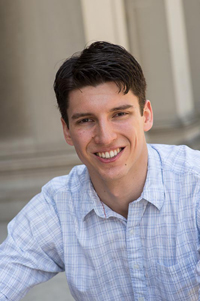Studying Energy at MIT means many things to many students. For some, it means urban planning or ocean engineering. For others, it means nuclear physics or climate science. Energy permeates almost all disciplines at MIT. This is the third installment of a 4-part series that offers an inside look at the interests and motivations of a few Energy Studies Minor students.

When Jake Jurewicz ’14, a nuclear science and engineering major, first came to MIT he had his sights set on studying nuclear fusion – the “Holy Grail,” he says, of energy sources because of its ability to produce a constant, clean supply of electricity. But it didn’t take long for Jurewicz to broaden his focus. His studies at MIT include not only developing and improving nuclear technology, but also the social and political issues that can present barriers to expanded use of nuclear energy.
“The nuclear industry struggles not from a lack of new ideas or engineering solutions, but from a means of implementing them,” Jurewicz says. “Politicians, social groups, and regulatory agencies are constantly changing and expanding their demands of nuclear energy.”
In answer to this, Jurewicz sought to supplement his nuclear engineering studies with the diverse portfolio of courses offered through the energy minor, to give him not just a deep understanding of energy, but a broad, cross-cutting understanding as well. The energy minor requirements, which Jurewicz is completing a full year before graduating, “integrate into and complement my major very well,” he says.
He also combined his research and academics with leadership training and practical knowledge. Jurewicz credits MIT’s Gordon Engineering Leadership (GEL) program, with teaching him new challenges and concepts through its focus on practice and experience. “GEL drops students into realistic scenarios that require quick organizational thinking and teamwork,” Jurewicz says.
Additionally, Jurewicz works as a research assistant in MIT’s Plasma Science Fusion Center and won a National Undergraduate Fellowship at the National Fusion Facility. There, he worked with General Atomics to develop new simulation and visualization software. Gaining extra-curricular experience and leadership training, Jurewicz feels, is absolutely necessary both for his aspirations to one day be a “major player” in the energy industry, and for the industry as a whole.
“Now more than ever, the world needs nuclear engineers to overcome the tremendous obstacles that exist for the industry, and bring viable, sustainable energy to grids across the globe,” Jurewicz says. “Only strong leadership can make this happen. I want to be one of those leaders to develop new technology and implement it to combat growing energy demands and climate change.”
This article is part of the I Minored in Energy at MIT: 4 Student Stories series.
- Read part 1: Chris Welch: Bringing Ocean Engineering to the Real World
- Read part 2: Casey Stein: Confronting the Energy-Water Challenge
- Read part 3: Jake Jurewicz: Meeting the Challenge of Nuclear Energy
- Read part 4: Shaena Berlin: Linking Energy and Environmental Challenges